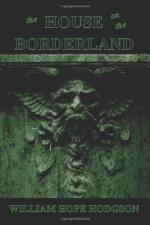Each sobbing breath is but a cry,
My heart-strokes knells of agony,
And my whole brain has but
one thought
That nevermore through life shall I
(Save in the ache of memory)
Touch hands with thee, who
now art naught!
Through the whole void of night I search,
So dumbly crying out to thee;
But thou are not; and
night’s vast throne
Becomes an all stupendous church
With star-bells knelling unto me
Who in all space am most alone!
An hungered, to the shore I creep,
Perchance some comfort waits on me
From the old Sea’s eternal
heart;
But lo! from all the solemn deep,
Far voices out of mystery
Seem questioning why we are
apart!
“Where’er I go I am alone
Who once, through thee, had all the world.
My breast is one whole raging
pain
For that which was, and now is flown
Into the Blank where life is hurled
Where all is not, nor is again!”
FOOTNOTES:
[1] An apparently unmeaning interpolation. I can find no previous reference in the MS. to this matter. It becomes clearer, however, in the light of succeeding incidents.—Ed.
[2] Here, the writing becomes undecipherable, owing to the damaged condition of this part of the MS. Below I print such fragments as are legible.—Ed.
[3] NOTE.—The severest scrutiny has not enabled me to decipher more of the damaged portion of the MS. It commences to be legible again with the chapter entitled “The Noise in the Night.”—Ed.
[4] The Recluse uses this as an illustration, evidently in the sense of the popular conception of a comet.—Ed.
[5] Evidently referring to something set forth in the missing and mutilated pages. See Fragments, Chapter 14—Ed.
[6] No further mention is made of the moon. From what is said here, it is evident that our satellite had greatly increased its distance from the earth. Possibly, at a later age it may even have broken loose from our attraction. I cannot but regret that no light is shed on this point.—Ed.
[7] Conceivably, frozen air.—Ed.
[8] See previous footnote. This would explain the snow (?) within the room.—Ed.
[9] I am confounded that neither here, nor later on, does the Recluse make any further mention of the continued north and south movement (apparent, of course,) of the sun from solstice to solstice.—Ed.
[10] At this time the sound-carrying atmosphere must have been either incredibly attenuated, or—more probably—nonexistent. In the light of this, it cannot be supposed that these, or any other, noises would have been apparent to living ears—to hearing, as we, in the material body, understand that sense.—Ed.
[11] I can only suppose that the time of the earth’s yearly journey had ceased to bear its present relative proportion to the period of the sun’s rotation.—Ed.




